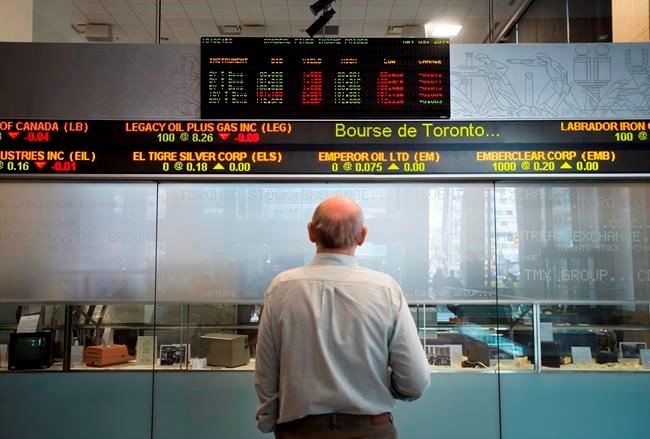TORONTO — North American stock markets rebounded from last week's Fed-induced losses as a falling U.S. dollar prompted a commodities rally.
Gold and silver prices climbed, copper rose and crude oil reached its highest level since October 2018.
Stock markets bounced back to start the trading week after losses last week once the U.S. central bank signalled a faster timeline for interest rate increases, saying two quarter-point hikes are likely in 2023. One bank member even suggested rates would start to increase next year.
"A little bit more calm is taking over the market here today and we're getting a little bit of money coming back into some of those sectors that had been hit pretty hard last week," said Mike Archibald, vice-president and portfolio manager with AGF Investments Inc.
The S&P/TSX composite index closed up 156.77 points at 20,156.36 after hitting an intraday high of 20,222.55.
In New York, the Dow Jones industrial average was up 586.89 points or 1.8 per cent at 33,876.97. The S&P 500 index was up 58.34 points at 4,224.79, while the Nasdaq composite was up 111.10 points at 14,141.48.
The Canadian dollar, which has lost 2.5 cents in the past couple of weeks as the U.S. greenback climbed, traded for 80.80 cents US compared with 80.52 cents US on Friday.
Nine of the 11 major sectors on the TSX were higher, led by a 4.7 per cent gain by energy as shares of Crescent Point Energy Corp. and MEG Energy Corp. surged 8.8 and 7.9 per cent, respectively.
The August crude contract was up US$1.83 at US$73.12 per barrel and the July natural gas contract was down 2.4 cents at US$3.19 per mmBTU.
The weaker U.S. dollar was part of the support for crude. The election of a hardline Iranian president also likely delayed a nuclear deal that would pave the way for about one million barrels a day of oil being added to global supplies to potentially suppress prices.
"Negotiations look like they're probably going to be halted for a period of time here and the demand side of the market is very tight right now and so that's really leading to this sharp move that you're seeing in the energy price today," Archibald said in an interview.
The Bank of America is forecasting that crude oil prices could reach US$100 a barrel next year.
Demand is rising as the U.S. summer driving season approaches and more jurisdictions are reopening after lockdowns designed to prevent the spread of COVID-19. Yet supply is constrained as companies haven't started to increase production.
"I do think that oil looks to me like it's still going to continue higher here in the near term," said Archibald. "Can it get to $100? I think you would have to have full global reopening and you would have to have almost no production increases from anywhere, which doesn't seem likely to me."
He said it's going to be very difficult for oil producers to resist bringing on more production if the price climbs to US$75 or US$80 a barrel.
"So it's always nice to think that things are going to go to a big round number and perhaps they will get there but I'm not entirely sure to be honest. I do think most companies globally right now, in particular in Canada, are making a ton of free cash flow at these prices."
Consumer discretionary gained 1.2 per cent, driven by increases from auto parts companies Linamar Corp., Magna International Inc. and Martinrea International Inc.
Higher metals prices helped materials as shares of Teck Resources Ltd. climbed 3.1 per cent.
The August gold contract was up US$13.90 at US$1,782.90 an ounce and the July copper contract was up 2.7 cents at US$4.18 a pound.
The heavyweight financials sector also got a lift as U.S. 10-year bond yields climbed from overnight lows to almost 1.5 per cent, which is helpful to bank profits.
The lone laggards on the day were consumer staples and utilities.
Archibald said investors will be watching congressional testimony from Fed chairman Jerome Powell on Tuesday to see if his message from last week remains the same.
He predicts markets will likely get a further bounce short-term even as we're getting into the typically choppy summer season.
"Just given how quickly things sold off at the end of last week, I would expect that we'll still probably have some volatility but likely to see stock prices probably rise over the balance of the week."
This report by The Canadian Press was first published June 21, 2021.
Companies in this story: (TSX:TECK.B, TSX:LNR, TSX:MG, TSX:MRE, TSX:MEG, TSX:CPG, TSX:GSPTSE, TSX:CADUSD=X)
Ross Marowits, The Canadian Press



